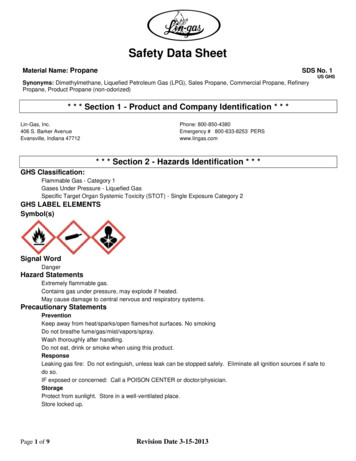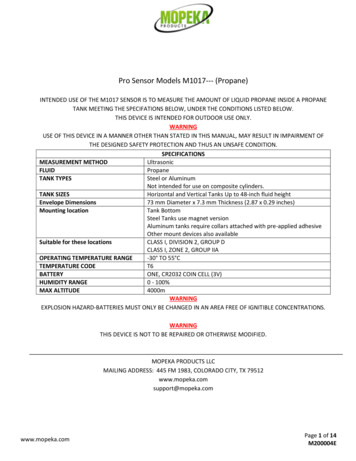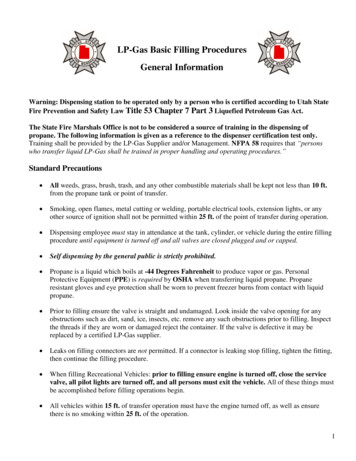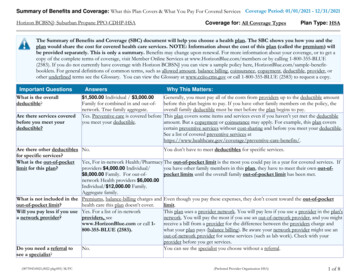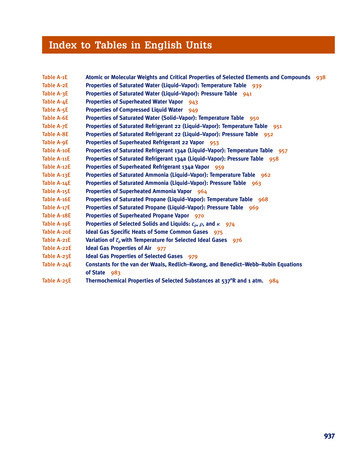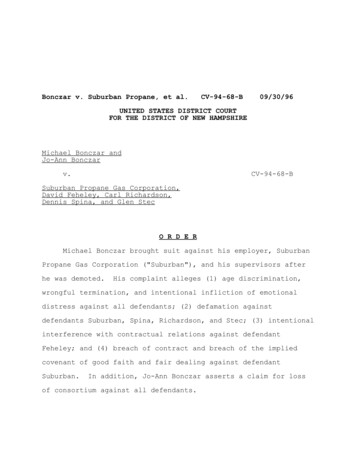
Transcription
Bonczar v. Suburban Propane, et a l .CV-94-68-B09/30/96UNITED STATES DISTRICT COURTFOR THE DISTRICT OF NEW HAMPSHIREMichael Bonczar andJo-Ann Bonczarv.CV-94-68-BSuburban Propane Gas Corporation,David Fehelev, Carl Richardson,Dennis Spina, and Glen StecO R D E RMichael Bonczar brought suit against his employer. SuburbanPropane Gas Corporationhe was demoted.("Suburban"), and his supervisors afterHis complaint alleges(1) age discrimination,wrongful termination, and intentional infliction of emotionaldistress against all defendants;(2) defamation againstdefendants Suburban, Spina, Richardson, and Stec;(3) intentionalinterference with contractual relations against defendantFeheley; and (4) breach of contract and breach of the impliedcovenant of good faith and fair dealing against defendantSuburban.In addition, Jo-Ann Bonczar asserts a claim for lossof consortium against all defendants.
The defendants have moved for summary judgment on allclaims.I grant summary judgment in favor of the individualdefendants on all claims against them and in Suburban's favor onthe claims for age discrimination, intentional infliction ofemotional distress, and defamation.Bonczar's claims forwrongful discharge, breach of contract, and breach of the duty ofgood faith and fair dealing against Suburban, and part of Jo-AnnBonczar's loss of consortium claim, survive as is explainedbelow.I.STANDARD OF REVIEWSummary judgment is appropriate if the record, taken in thelight most favorable to the non-moving party, shows that nogenuine issues of material fact exist and the moving party isentitled to judgment as a matter of law.Commercial Union Ins. Co. v. Walbrook Ins.(1st Cir. 1993).Fed. R. Civ. P. 56(c);Co., 7 F.3d 1047, 1050A "material fact" is one "that might affecttheoutcome of the suit under the governing law," and a genuinefactual issue exists if "the evidence is such that a reasonablejury could return a verdict for the nonmoving party."v. Liberty Lobby, Inc., 477 U.S. 242, 248 (1986).2Anderson
Affidavits supporting or opposing a motion for summaryjudgment " [must] be made on personal knowledge,[must] set forthsuch facts as would be admissible in evidence, and [must] showaffirmatively that the affiant is competent to testify to thematters stated therein."Fed. R. Civ. P. 56(e).The partyopposing consideration of an affidavit must specify theobjectionable portions and the grounds for objection.CasasOffice Machs. v. Mita Coovstar America, 42 F.3d 668, 682 (1stCir. 1994).affidavit.I may disregard only inadmissible portions of anI state the background facts in accordance with thestandard of review.II.BACKGROUNDBonczar began working as a truck driver for defendantSuburban Propane in 1972, and then worked his way up to aregional manager position for Maine, New Hampshire, and Vermontby 1989.David Feheley, the area vice president, was hisimmediate supervisor.Feheley reported to Carl Richardson, asenior vice president, who reported to Dennis Spina, president ofSuburban.Glen Stec was vice president of human resources.One way in which Suburban's management attempted to evaluatethe company's financial health was by examining changes in its3
ratio of customer losses to customer gainsratio").(the "loss-to-gainIn February 1991, Feheley warned Bonczar and the otherregional managers that he expected each region to improve itsloss-to-gain ratio.Feheley followed up his warning with anApril 1991 memorandum in which he instructed his regionalmanagers:Please advise your district managers of ourdecision regarding the management of customerremovals. A district is not to perform whatwould eguate to a customer removal unlessthere is a corresponding installation tocounteract the removal.Bonczar and other regional managers interpreted this memorandumas an instruction to falsify reports when necessary in order toshow an improving loss-to-gain ratio.As a result, Bonczarallowed his district managers to submit false reports.In the fall of 1991, Walt Wojewodzic, the credit andcollections manager for Bonczar's region, raised the issue offalse reports with Spina during a meeting of credit andcollections managers at Suburban's headguarters.This actionprompted Feheley to order Bonczar to fire Wojewodzic.Bonczarrefused to comply with Feheley's directive.In February 1992, Bonczar held a series of meetings with hisdistrict managers to address the false reports issue.Duringthese meetings, he informed his staff that he planned to meet4
with Spina and request that Spina rescind Feheley's April 1991directive.However, before Bonczar could meet with Spina,Wojewodzic asked Spina to meet with all of the district managersto discuss Feheley's policy.Spina held this meeting on February19, 1992, but barred Bonczar from participating.On February 24, 1992, Richardson called Bonczar andsuspended him.Bonczar began to suffer from extreme anxiety,including bouts of hyperventilation, for which he soughtprofessional help.Stec ordered Bonczar to attend a meeting onFebruary 28 with him. Spina, and Richardson at the companyheadquarters in Whippany, New Jersey.Bonczar was too upset todrive, so his wife drove him to the meeting.and one-half hours.It lasted about twoSpina and Richardson criticized Bonczarharshly for, inter alia, lacking leadership, blaming problems onupper level management, falsifying reports, writingunprofessional memoranda,1 and failing to complete requiredevaluations of his district managers.Several days after the February 28 meeting, Richardson andFeheley informed Bonczar that he was no longer a regional1 In one memorandum to his district managers, Bonczarstated, "the only difference between a brown-noser and a shithead is depth perception."In another memorandum, he instructedhis district managers to "cover thy posterior".5
manager, but that he could continue to work for Suburban as aDistrict Manager for the same pay.Bonczar refused their offer,and appealed through Suburban's Employee Appeal and Review System("EARS").Feheley considered and denied Bonczar's first appeal.Suburban never considered Bonczar's second appeal because Bonczarwas unable to drive to New Jersey for another scheduled meeting.He never returned to work.During the same time period, Feheley and Spina made severalage-related comments.Feheley often braggedabout having beenthe youngest regional manager, and suggested that he was proud ofthe general youth of his staff.At a meeting of the regionalmanagers in 1991, he referred to Bonczar, who was then forty-six,and another manager as "old bucks."Spina told the districtmanagers at the February 19, 1992, meeting that he disliked the"old" Suburban management style.Suburban filled Bonczar'sregional position with a thirty-five year-old employee.III.A.DISCUSSIONCOUNT I: AGE DISCRIMINATIONBonczar alleges that defendants discriminated against himthe basis of his age in violation of the AgeDiscrimination inEmployment Act of 1967, 29 U.S.C.A. § 621, et seq.6on(West 1985 &
Supp. 1995)("ADEA").Under the ADEA, a plaintiff may establishdiscrimination either by direct or by circumstantial evidence.Direct evidence must be the "evidentiary equivalent of a smokinggun," Smith v. F.W. Morse & Co., 76 F.3d 413, 421(1st Cir.1996), such that, if believed, it would establish discriminationwithout any inferences.958 (5th Cir. 1993).Bodenheimer v. PPG Indus., 5 F.3d 955,If a plaintiff produces direct evidencethat discrimination was a motivating factor in the adverseemployment decision, the burden shifts to the defendant to provethat it would have made the same decision absent a discriminatorymotive.467Smith, 76 F.3d at 421; Jackson v. Harvard, 900 F.2d 464,(1st Cir. 1990), cert, denied, 498 U.S. 848 (1990).2When, as is frequently the case, a plaintiff is forced torely on circumstantial evidence, the burden-shifting frameworkannounced in McDonnell Douglas Corp. v. Green, 411 U.S. 792, 802(1973) and most recently explained in St. Mary's Honor Ctr. v.Hicks, 509 U.S. 502 (1993), applies.Paqes-Cahue v. Iberia2 The Civil Rights Act of 1991 changed the law in Title VIIcases to permit a plaintiff to recover declaratory relief,injunctive relief, costs, and attorneys' fees when the employeemeets its burden of proof under Price Waterhouse v. Hopkins, 490U.S. 228, 277 (1989) if discrimination nevertheless was amotivating factor in the employer's decision.See 42 U.S.C.A. §2000e-2(a) (West 1994). However, this portion of the CivilRights Act of 1991 does not apply to age discrimination claims.Thus, Price Waterhouse still applies to such claims.7
Lineas Aereas de Espana, 82 F.3d 533, 537(1st Cir. 1996);LeBlanc v. Great American Ins. Co, 6 F.3d 836, 842-431993), cert, denied, 114 S.Ct. 1398(1994).(1st Cir.The plaintiff mustestablish a prima facie case of discrimination by proving by apreponderance of the evidence that (1) he was a member of aprotected class,(2) he performed his job adequately,(3) he wasnevertheless dismissed/demoted and (4) his employer eitherreplaced him with a younger person or otherwise did not treat ageneutrally.See Hicks 509 U.S. at 506; Paqes-Cahue, 82 F.3d at533; Woodman v. Haemonetics Corp., 51 F.3d 1087, 1091-92Cir. 1995).(1stWhile the burden of persuasion remains with theplaintiff throughout the case, a presumption of discriminationarises from proof of his prima facie case.507.Hicks, 509 U.S. atTo rebut this presumption, the employer must produceevidence which, "taken as true, would permit the conclusion thatthere was a nondiscriminatory reason for the adverse action."Id. at 509.If the employer meets its burden of production, thepresumption of discrimination "drops out of the picture."509 U.S. at 511.Hicks,Accord, Paqes-Cahue, 82 F.3d at 536; Woodman,51 F.3d at 1091; LeBlanc, 6 F.3d at 843.Though Hicks recognizes that an employee always remainsresponsible for proving that her employer dismissed her because
of her age, it also provides in dicta that:The factfinder's disbelief of the reasons put forwardby the defendant (particularly if disbelief isaccompanied by a suspicion of mendacity) may, togetherwith the elements of the prima facie case, suffice toshow intentional discrimination.Thus, rejection ofthe defendant's proffered reasons, [sic] will permitthe trier of fact to infer the ultimate fact ofintentional discrimination.509 U.S. at 511(emphasis in original).At least one circuitinterprets this dicta to entitle a plaintiff to submit her claimto the jury whenever she has proved her prima facie case anddemonstrated that the employer's reason for its action was false.Anderson v. Baxter Healthcare Corp., 13 F.3d 1120, 1123 (7th Cir.1994) .The First Circuit, however, has determined that proof ofa prima facie case and evidence of pretext will suffice only ifthe factfinder could reasonably conclude from all of the evidencethat the defendant intentionally discriminated against theplaintiff.See Barbour v. Dynamics Research Corp., 63 F.3d 32,39 (1st Cir. 1995), cert, denied, 116 S.Ct. 914 (1996); Udo v .Tomes, 54 F.3d 9, 13 (1st Cir. 1995); Smith v. Stratus Computer,40 F.3d 11, 16 (1st Cir. 1994), cert, denied, 115 S.Ct. 1958(1995); Woods v. Friction Materials, 30 F.3d 255, 260-61 n.3Cir. 1994).(1stIn other words, proof of a prima facie case pluspretext will be enough to survive summary judgment in some butnot all cases.See, e.g. Woods, 30 F.3d at 260-61 n.3.I apply
the First Circuit standard in evaluating Bonczar's claim.Bonczar contends that he has produced sufficient directevidence of discrimination to qualify his claim as a directevidence case.the following:I disagree.Bonczar supports his position with(1) Feheley once referred to Bonczar and anotherolder employee as "old bucks" at a meeting of regional managersin 1991;(2) Feheley once boasted of the general youth of hisstaff, often bragged about being the youngest regional manager inSuburban, and once commented on his own relative youth around thetime of his birthday;(3) Spina was rumored to be eager to doaway with the "old" Suburban culture and employees;(4) whenSpina learned that Richardson, another employee, planned toretire early, he told him that "he would F [Richardson] before[Richardson] F'd him,"(abbreviation in original) and that he"didn't want people around him unless they were going to be therefor ten years or longer"; and (5) Richardson believed that he wasthe victim of age discrimination because Spina fired him forrequesting an early retirement plan.While some of thesestatements and actions arguably evidence age consciousness byBonczar's superior, they do not constitute direct evidence ofBonczar's claim that he was demoted because of his age.AsJustice O'Connor observed in her concurring opinion in Price10
Waterhouse, "[S]tray remarks in the workplace, while perhapsprobative of sexual harassment,. . . cannot justify requiringthe employer to prove that its hiring or promotion decisions werebased on legitimate criteria.Nor can statements by nondecision makers, or statements by decisionmakers unrelated to thedecisional process itself, suffice to satisfy the plaintiff'sburden in this regard."Price Waterhouse, 490 U.S. at 277(internal citations omitted).Therefore, I will analyze hisclaim under the McDonell-Douqlas framework.Defendants do not dispute that Bonczar has made out a primafacie case of age discrimination, and Bonczar does not disputethat Suburban has articulated a legitimate, nondiscriminatoryreason for demoting him.As discussed above, in the FirstCircuit, regardless of whether Suburban's reasons for demotingBonczar were pretextual, Bonczar cannot prevail unless areasonable jury could infer that, but for its discriminatoryanimus. Suburban would not have demoted him.Mesnick v. GeneralElec. C o ., 950 F.2d 816, 824 (1st Cir. 1991), cert, denied, 504U.S. 985 (1992).Therefore, I need decide only whether Bonczarhas produced evidence from which a reasonable jury could inferthat he was demoted because of his age.11
Accordingly, pro-youth statements such as those attributedto Feheley, without more, will not support an inference of agediscrimination.Id. at 826.For example, in Mesnick, thestatement by plaintiff's superior that he was "sad to lose theyouth of the workforce" could not sufficiently support aninference of discriminatory animus.Id. (collecting cases).Even assuming that Spina's reported statements concerning the"old" Suburban culture and employees are admissible evidence,they show at most only that Spina was biased against employeeswho had been with Suburban for a long time, not that he wasbiased against older employees.These statements, and the otherstatements cited by Bonczar and discussed previously are simplyinsufficient to permit a reasonable jury to conclude that Bonczarwas demoted because of his age.Therefore, I grant defendants'motion for summary judgment as to plaintiffs' age discriminationclaim.B.COUNT II:WRONGFUL DISCHARGETo prevail on a claim of wrongful discharge under NewHampshire law, Bonczar must show (1) that he was discharged outof bad faith, malice, or in retaliation for (2) performing actswhich public policy would encourage or refusing to perform actswhich public policy would condemn.12Short v. School Admin. Unit
N o . 16, 136 N.H. 76, 84(1992).3Essentially, Bonczar claimsthat he was discharged for refusing to carry out a company policyof falsifying customer gain/loss reports to make districts in hisregion look more successful than they actually were.Defendantsargue that Bonczar's claim of wrongful discharge fails for threereasons.First, the defendants argue that Bonczar's claim isprecluded by New Hampshire's Whistleblowers' Protection Act, N.H.Rev. Stat. Ann. ch. 275-E (Supp. 1995).However, the Act statesexplicitly:275-E:5 No Effect on Bargaining or Common Law Rights.This chapter shall not be construed to diminish orimpair . . . any common law rights.Therefore, regardless of whether Bonczar has complied with theconditions for bringing a claim under the statute, it does notpreclude his claim for wrongful discharge.Second, they argue that Bonczar cannot show that he wasdemoted for performing acts which public policy would encourageor refusing to perform acts which public policy would condemn.According to the defendants, Bonczar's management errors causedhis demise after he misinterpreted several memoranda Feheley sent3 The parties do not dispute that Bonczar was an at-willemployee. Neither do they dispute that he was constructivelydischarged.13
him.As a result, Bonczar allowed his district managers tofalsify their gain/loss records.As defendants see it, Bonczarcontinued to force his subordinates to submit false reports untilthey complained to Spina.Bonczar, however, has provided evidence from which areasonable jury could infer guite a different story.Accordingto Bonczar's evidence, in early 1991, Feheley made clear toBonczar and other regional managers that the customer gain/lossreports should be falsified if necessary to demonstrate apositive trend.Bonczar was concerned about the policy, but alsoconcerned that he might be punished if he objected to it.Wojewodzic was also concerned about the policy, and raised theissue directly with Spina at a meeting in October, 1991.Thatsame day, Richardson reported Wojewodzic's comments to Feheley,and Feheley ordered Bonczar to fire Wojewodzic, which Bonczarrefused to do.Bonczar thereafter held two meetings with his districtmanagers to decide how to deal with the policy.On February 14,1992, Wojewodzic faxed an emotional letter to Spina, reguesting ameeting with Spina, Bonczar, Stec and all the region's districtmanagers to discuss Feheley's policy.Spina held the meeting,but barred Bonczar, and made clear to the district managers that14
he would continue to support Feheley.suspended Bonczar.On February 24, RichardsonAfter a meeting on February 28, 1992 withSpina, Richardson, and Stec, Richardson and Feheley calledBonczar and told him that he had been demoted to districtmanager.Defendants do not dispute that falsifying customer gain/lossreports is an activity which public policy would condemn.Bonczar has provided evidence from which a reasonable jury couldinfer that he was demoted because he resisted Feheley's policy byrefusing to fire Wojewodzic and by holding meetings with hisdistrict managers to discuss how best to solve the problem.Therefore, Bonczar has satisfied the public policy reguirement ofa claim for wrongful discharge.Third, defendants contend that Bonczar was not dischargedfor resisting the falsification policy, but for circulatingunprofessional memoranda and for lowering the morale of thedistrict managers in his region by showing reluctance to complywith the policies set by upper-level management and by sidingwith lower-level employees.4For example, in a memo dated May 1,1991, titled "FIRESIDE CHAT," Bonczar wrote:4 In addition, in a letter dated March 2, 1992, Spina,Richardson, and Stec explained that he was being demoted becausehe had ordered his district managers to falsify reports.15
. . . any memos that I send out to you from Mr. D.R.Feheley's office, please read through the threats andintimidating verbiage (rhymes with garbage) and justtry to get the simple point he is trying to get across.I really don't have time to rewrite all of his memos. . . And remember those great words of Walt Wojewodzic, whoonce said the only difference between a brown-noser and ashit-head is depth perception.In a memo entitled "Improve Your Bottom Line," headed by apicture of a row of naked babies' bottoms, Bonczar expressed"mixed emotions" about a trip to headguarters, and concluded:I only half agree with Gerry Hendrickson when he says thatbosses are like diapers.They are always on your ass andusually full of sh t!!! Let's show them we can do what'sneeded.Bonczar also gave Feheley a hat made to look like a condom at aChristmas party in 1990 or 1991 "because of what we had thoughtof him."Notwithstanding the defendant's evidence, a reasonable jurycould infer from the evidence submitted that until it knewBonczar was resisting the falsification policy. Suburban thoughthe was an excellent employee.In twenty years of employment withSuburban, Bonczar had never been reprimanded.In October of1990, he received a very favorable employee evaluation.Onemonth before his demotion, Bonczar received a silver pin for hisoutstanding accomplishments.Therefore, a reasonable jury couldinfer that Bonczar was constructively discharged for resisting16
Feheley's policy of falsifying customer gain/loss reports, anddefendants would not be entitled to summary judgment on thewrongful discharge claim.Finally, individual defendants Spina, Richardson, Stec, andFeheley argue that the wrongful discharge claim against them mustbe dismissed because they did not employ Bonczar.Regardless ofwhether a claim for wrongful discharge sounds in tort or incontract, it rests on an employment relationship between theparties.Miller v. CBC Companies, Inc., 908 F.Supp. 1054, 1067(D.N.H. 1995).It is undisputed that Spina, Richardson, Stec andFeheley did not employ Bonczar.Therefore, I grant defendants'motion regarding the wrongful discharge claim against individualdefendants.C.Id.COUNT III: INTENTIONAL INFLICTION OF EMOTIONAL DISTRESSIn Count III, Bonczar seeks to recover from Suburban and theindividual defendants for intentional infliction of emotionaldistress.New Hampshire's Workers' Compensation Law provides, inpertinent part:281-A:8Employees Presumed to Have Accepted.I. Anemployee of an employer subject to this chapter shallbe conclusively presumed to have accepted theprovisions of this chapter and, on behalf of theemployee, or the employee's personal or legalrepresentatives, to have waived all rights of actionwhether at common law or by statute or provided underthe laws of any other state or otherwise:17
(a) Against the employer or the employer'sinsurance carrier . . .; and(b) Except for intentional torts, againstany officer, director, agent, servant oremployee acting on behalf of the employer orthe employer's insurance carrier. . .N.H. Rev. Stat. Ann. § 281-A:8(Supp. 1995).Therefore, Bonczaris barred from suing Suburban, his employer, for the intentionaltort of intentional infliction of emotional distress.See Duquavv. Androscoggin Valiev Hosp., 1996 WL 157191, *2 (D.N.H. 1996);Thompson v. Forest, 136 N.H. 215, 219 (19 92); O'Keefe v.Associated Grocers of New England, Inc., 120 N.H. 834, 835-36(1980); Censullo v. Brenka Video, Inc., 989 F.2d 40, 43 (1st Cir.1993); Bourgue v. Town of Bow, 736 F. Supp. 398, 404(D.N.H.1990) .Bonczar's claims of intentional infliction of emotionaldistress against individual defendants Feheley, Richardson,Spina, and Stec also fail.To maintain a claim for intentionalinfliction of emotional distress, Bonczar must establish that thedefendants "by extreme and outrageous conduct intentionally orrecklessly cause[d] severe emotional distressv. Morancv, 134 N.H. 493, 495-96 (1991)(Second) of Torts § 46 (1965)).[to him]."Morancy(guoting RestatementBonczar has submitted evidencefrom which a reasonable jury could infer that he did in fact18
suffer severe emotional distress.However, he has submitted noevidence from which a reasonable jury could infer thatdefendants' conduct went "beyond all possible bounds of decency,and [would] be regarded as atrocious, and utterly intolerable ina civilized community."Restatement(Second) of Torts § 46 cmt.d; accord Jarvis v. Prudential Ins. Co., 122 N.H. 648, 652(1982) .1.David FeheleyBonczar submitted evidence indicating that Feheley forcedhis regional and district managers to lie about their customerlosses and gains.Bonczar also submitted evidence that Feheleyparticipated in the decision to demote him for, inter alia,encouraging district managers.Feheley also denied Bonczar'sfirst appeal in Suburban's disciplinary review system.Feheleywas not present at the February 19 meeting, he did not sign theletter informing Bonczar of his demotion, and although he was onthe telephone, he did not speak while Richardson informed Bonczarof the decision to demote him.Feheley's behavior, as reportedby Bonczar, though reprehensible, was not "extreme andoutrageous" enough to allow recovery.See Brewer v. K.W.Thompson Tool Co., 647 F. Supp. 1562, 1564, 1566-67(D.N.H. 1986)(no intentional infliction of emotional distress where defendant19
refused to provide samples to plaintiff to help him investigatework-related skin condition, thereby preventing plaintiff fromobtaining medical release from doctor, then refused to allowplaintiff to return to work without medical release).2.Carl Richardson and Glen StecAfter Spina met with the district managers, Richardson andStec called Bonczar to suspend him on February 24 withoutexplanation.Stec called Bonczar and ordered him to attend ameeting at the company headguarters in Whippany, New Jersey onFebruary 28 to defend himself.at the meeting.guiet.Richardson, Stec, and Spina wereRichardson noticed that Bonczar was unusuallyStec observed that Bonczar was upset at the meeting and"seemed to be a little disoriented in trying to understand whatwas happening" when Stec met him in the lobby beforehand.Richardson was loud and upset and fired guestions at Bonczarwithout listening to his answers.Stec was guiet, andinterrupted only once to ask Richardson and Spina to allowBonczar to answer a guestion uninterrupted.Spina and Richardsoncriticized Bonczar for falsifying budget numbers, failing to sendin performance appraisals for the district managers, thuspreventing the district managers from getting raises, and forfalsifying the customer gain/loss reports.20Bonczar responded
that Feheley's office had forced him to do these things, and thathe had organized the February 19 meeting to decide what to doabout Feheley.Spina and Richardson also criticized Bonczar forwriting unprofessional memoranda.The meeting lastedapproximately two and one-half hours.Richardson and Feheleycalled Bonczar several days later and Richardson told him thatthey had decided to demote him and (erroneously) that thedecision could not be appealed.Bonczar then called Stec, whotold him that the decision was appealable.Stec's conduct was by no means "extreme and outrageous"Morancv, 134 N.H. at 496.Though Richardson was perhapsintimidating and insensitive at the February 28 meeting, hisconduct also was far from outrageous.C f . Miller v. CBCCompanies, Inc., 908 F. Supp. 1054, 1068 (D.N.H. 1995)(plaintiff"just barely" survived motion to dismiss where supervisorspersistently told her that women should stay home and care fortheir children and guestioned her ability to work and to care forher retarded son simultaneously); Sinqleterry v. Nashua CartridgeProducts, 1995 WL 54440, *6-7(D.N.H. 1995)(plaintiff allegedfacts sufficient to support intentional infliction of emotionaldistress where defendant supervisor called plaintiff "nigger,"physically assaulted plaintiff, and humiliated plaintiff by21
violating company policy and handing him a letter of warning infront of his co-workers).Therefore, plaintiff's claims ofintentional infliction of emotional distress against Stec andRichardson are dismissed.3.Dennis SpinaIn addition to berating Bonczar at the February 28 meeting.Spina barred Bonczar from the February 19 meeting Bonczar hadorganized with the district managers.According to a transcriptof the meeting submitted by plaintiff (assuming without decidingthat it is admissible). Spina called Bonczar "immature," andcriticized his leadership.Spina explained that he had excludedmiddle-management, specifically Bonczar, from the meeting becausehe wanted the district managers to speak freely.Bonczar hassubmitted no evidence suggesting that Spina intended to tormentBonczar by excluding him, or that Spina should have known that hewould cause Bonczar severe mental distress by excluding him.Like Richardson, although Spina may have acted inappropriately byinsulting Bonczar at the February 19 meeting and by being angryand insensitive at the February 28 meeting, his conduct wasneither extreme nor outrageous.The intentional infliction ofemotional distress claim against Spina is dismissed.22
D.COUNT IV:DEFAMATIONBecause both libel and slander are evaluated as defamatorystatements, I need not distinguish between them.See Morrissettev. Cowette, 122 N.H. 731, 733 (1982); Restatement(Second) ofTorts § 568 (1977).To prove defamation under New Hampshire law,a private individual plaintiff must show that the "defendantfailed to exercise reasonable care in publishing, without a validprivilege, a false and defamatory statement of fact about theplaintiff to a third party."Independent Mechanical Contractors,Inc. v. Gordon T. Burke & Sons, Inc., 138 N.H. 110, 118 (1993);accord Duchesnave v. Munro Enterprises, 125 N.H. 244, 250 (1984) .A statement is defamatory only if it "tends to lower theplaintiff in the esteem of any substantial and respectable groupof people."Nash v. Keene Pub. Corp., 127 N.H. 214, 219 (1985).Statements that are substantially true are not actionable.Simpkins v. Snow, 139 N.H. 735, 740(1995) .Opinions can serve as the basis for a defamation claim ifthe opinion reasonably implies false and defamatory facts.Milkovich v. Lorain Journal Co., 497 U.S. 1, 20-21Duchesnave, 125 N.H. at 249.(1990);However, a statement of opinion isnot actionable unless it is "sufficiently factual to besusceptible of being proved true or false."23Milkovich, 497 U.S.
at 21; accord Phantom Touring, Inc. v. Affiliated Publications,953 F.2d 724, 727-28(1992).(1st Cir.),. cert, denied, 504 U.S. 974Further, an opinion cannot constitute defamation if itis apparent from the surrounding context that the opinion isbased solely on disclosed non-defamatory facts.StandingCommittee on Discipline of the U. S. Dist. Court for Cent. Dist.of Cal. v. Yagman, 55 F.3d 1430, 1439 (9th Cir. 1995); Nash, 127N.H. at 219; Restatement(Second) of Torts § 566 cmt. c (1977)("A simple expression of opinion based on disclosed . . .nondefamatory facts is not itself suffic
Bonczar v. Suburban Propane, et al. CV-94-68-B 09/30/96 UNITED STATES DISTRICT COURT FOR THE DISTRICT OF NEW HAMPSHIRE Michael Bonczar and Jo-Ann Bonczar v. CV-94-68-B Suburban Propane Gas Corporation, David Fehelev, Carl Richardson, Dennis Spina, and Glen Stec ORDER Michael Bonczar brought suit against his employer. Suburban

